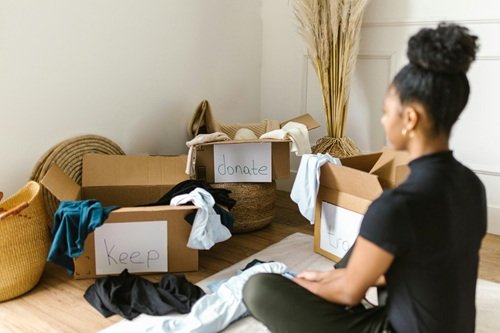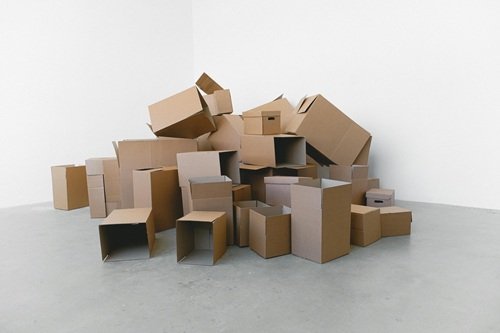In today’s fast-paced world, our homes often reflect the chaos of our daily lives. Between work, social obligations, and digital distractions, clutter can quickly build up without us even noticing. Yet, what many people don’t realize is that physical clutter isn’t just about messy spaces — it can also take a toll on our mental well-being.
Studies show that clutter increases stress, lowers productivity, and even affects sleep quality. The good news? By taking small, intentional steps to simplify and organize your home, you can create an environment that supports relaxation, focus, and emotional balance.


Here are five easy ways to declutter your home and boost your mental clarity starting today.
1. Start Small and Stay Consistent
Decluttering doesn’t mean you have to tackle your entire house in one weekend. In fact, trying to do too much at once can lead to burnout and frustration. The key is to start small and stay consistent.
a. Choose One Area at a Time
Begin with a small, manageable space — maybe your kitchen counter, a desk drawer, or your closet floor. Once you finish that area, move on to another. Each small win builds momentum and keeps you motivated.
b. Set a Timer
Try the “15-Minute Declutter Rule.” Set a timer for 15–20 minutes and focus solely on tidying one area. When the timer goes off, stop. You’ll be amazed at how much progress you can make in a short amount of time.
c. Make Decluttering a Habit
Decluttering should be part of your routine, not a once-a-year event. Schedule short sessions weekly to maintain a clutter-free environment. This consistency keeps your home tidy and your mind clear.
2. Adopt the One-In, One-Out Rule
One of the easiest ways to prevent clutter from returning is by following the One-In, One-Out Rule — every time you bring something new into your home, you remove one existing item.
For example:
- Buy a new pair of shoes? Donate an old pair.
- Get a new kitchen gadget? Pass along the one you rarely use.
This approach keeps your belongings in balance and prevents accumulation over time.
Why It Works
The rule forces you to think intentionally about what you bring into your home. It also helps you break the habit of emotional shopping or buying items you don’t truly need.
Bonus Tip: Create a Donation Box
Keep a small box or bag in your closet for items you no longer want. Once it’s full, donate or recycle everything inside. This small step keeps clutter from building up and gives your unused belongings a new life elsewhere.


Read More: Silent Walks: Why Gen Z Is Ditching Headphones for Mindful Mornings in 2025 | What is 75 hard challenge? | HOW YOGA BENEFITS YOU IN EVERYDAY LIFE | WHAT IS CARB CYCLE – FAST FAT BURNING PROCESS! | Fittheories | 10 Powerful Reasons Why Outdoor Sports Are Essential for Family Bonding
3. Digitize and Simplify Paper Clutter
Paper is one of the sneakiest forms of clutter. Bills, receipts, old letters, and random documents can pile up fast. While it may seem harmless, paper clutter can cause visual stress and make it hard to find important items when you need them.
a. Go Paperless Where Possible
Most companies now offer digital billing and statements. Sign up for paperless options to reduce incoming mail. You can also scan and store important documents securely in cloud storage.
b. Create a Simple Filing System
For papers you must keep (like tax documents or warranties), use labeled folders or a small filing box. Group similar items together and keep them in one designated spot.
c. Manage Incoming Mail Immediately
Instead of letting mail pile up on the counter, deal with it the day it arrives. Sort it into three categories: to act on, to file, and to recycle.
Decluttering your paperwork not only saves space but also clears mental distractions. There’s something deeply calming about knowing exactly where everything is when you need it.
4. Declutter with Emotion in Mind
We often hold onto items for emotional reasons — souvenirs, gifts, or things that remind us of certain times or people. While it’s healthy to keep meaningful items, too many sentimental possessions can weigh you down mentally and emotionally.
a. Ask the Right Questions
When deciding what to keep, ask yourself:
- Do I use or love this item?
- Does it add value to my life right now?
- Am I keeping it out of guilt or obligation?
If an item doesn’t serve you in the present, it might be time to let it go.
b. Take Photos of Sentimental Items
If you struggle to part with something because of the memories attached, take a photo of it before letting it go. This allows you to preserve the sentiment without the physical clutter.
c. Honor, Then Release
It’s okay to thank an item for its purpose before donating or discarding it. This mindset, inspired by the KonMari method, helps you declutter with gratitude instead of guilt.
5. Create Systems That Work for You
Decluttering is not just about removing items — it’s about creating systems that make it easy to stay organized in the long run. A clutter-free home is a combination of intentional choices and simple systems.
a. Give Everything a Home
Every item should have a designated spot. Whether it’s your keys, mail, or shoes, keeping things in their place prevents messes from reappearing.
b. Use Storage Solutions Wisely
Use baskets, shelves, or drawer organizers to keep similar items together. Avoid overstuffing storage bins — they should make your space more functional, not hide clutter.
c. Declutter Your Digital Spaces Too
Digital clutter — endless notifications, messy desktops, or overflowing inboxes — can be just as overwhelming as physical clutter. Set aside time each week to:
- Delete old files
- Unsubscribe from unnecessary emails
- Organize folders and photos
A clean digital space mirrors a clean physical space — both lead to greater focus and calm.


The Link Between Decluttering and Mental Clarity
When your home is cluttered, your brain receives constant reminders of unfinished tasks. This can lead to stress, decision fatigue, and even anxiety. On the other hand, a clean, organized environment fosters a sense of peace and control.Our surroundings have a direct impact on how we think and feel. When our homes are cluttered, our minds often mirror that chaos—leading to stress, distraction, and mental fatigue. Decluttering helps restore a sense of order and control, allowing your brain to relax and focus more easily. A tidy space reduces visual noise, clears mental overload, and promotes calmness, making it easier to concentrate, make decisions, and feel emotionally balanced. In essence, when you declutter your environment, you also declutter your mind.
Here’s how decluttering supports your mental clarity:
- Reduces stress: A tidy home sends your brain the message that it’s safe to relax.
- Improves focus: With fewer visual distractions, you can think more clearly.
- Increases energy: Less clutter means less decision-making, leaving you more mental energy for what matters.
- Boosts mood: A clean, organized home naturally lifts your spirits and promotes calmness.
Decluttering isn’t just about aesthetics — it’s a form of self-care that helps you align your physical surroundings with your emotional well-being.
Final Thoughts
Decluttering your home is more than just a cleaning task—it’s a powerful way to create space for peace, focus, and happiness. When you intentionally let go of the excess, you make room for what truly matters: comfort, clarity, and balance. Start small, stay consistent, and celebrate each step forward. With time, you’ll find that an organized home naturally nurtures a calmer mind and a more positive outlook on life.
Creating a clutter-free home doesn’t have to be overwhelming or time-consuming. By starting small, setting clear boundaries, and developing sustainable habits, you can transform your living space — and your mind — into a sanctuary of calm.
When your home feels lighter, so do you.
So, grab a box, put on your favorite playlist, and start with one corner. Each step toward decluttering is a step toward mental clarity, peace, and a happier you.


Also Read: 7 Simple Ways to Cultivate Gratitude and Find Joy in Everyday Moments | The Primal Fitness Comeback: Why Natural Movement is Booming in 2025 | 7 Powerful Reasons Why Pickleball Is the Fastest-Growing Outdoor Fitness Trend | Labubu Blind Boxes Unboxed: The Viral Toy Craze Redefining Fashion and Fandom in 2025 | Digital detox 2025 | Sustainable Lifestyle 2025